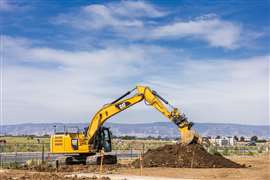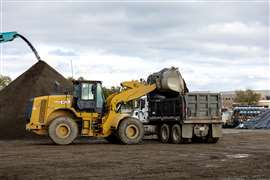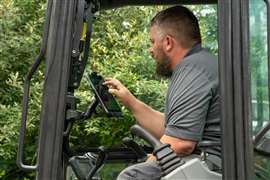Why should the industry embrace machine control?
14 March 2024
Luc Le Maire, senior VP and general manager Positioning Solutions EMEA at Topcon Positioning Systems, highlights the benefits of machine control in construction and how it can change the way we are currently working.
 Efficiency is not just a goal but a necessity in the construction industry (Photo: Topcon)
Efficiency is not just a goal but a necessity in the construction industry (Photo: Topcon)
Machine control has the power to revolutionise the construction industry by enhancing efficiency, accuracy, and productivity. It also plays a vital role in accelerating the sector’s journey to net zero and bridging the skills gap – yet adoption remains low.
In our report, The Future of Machine Control, most contractors said they use machine control technology on less than a quarter of their projects. However, in the face of record-high demand, the need for the industry to embrace innovation is clear – especially set against a backdrop of rising costs, shrinking budgets and labour shortages.
We spoke to 1,000 decision-makers in European construction companies about how they’re currently using machine control, what’s stopping it from being used more, and what they think it’ll take for the sector to embrace it in the future. One thing is clear: radical change is needed to futureproof the sector and ensure we can meet the demands of our ever-growing population.
The report outlines three key benefits of machine control – efficiency, sustainability and accuracy – and explores how those in construction can adopt the technology to impact projects positively in future.
How efficient is construction?
Efficiency is not just a goal but a necessity in the construction industry. It influences every aspect of a project, from its financial success to its impact on the environment and the safety of those involved.
Now more than ever, the need to reduce costs and tightly manage often-stretched resources has seen industry leaders prioritise productivity. Digital technologies such as machine control are explicitly designed to improve efficiency and closely track output, delivering valuable insight to help operational teams optimise workflows.
Machine control and automation streamline on-site activity, enabling machines to work continuously and efficiently, reducing downtime and improving the planning and management of materials, fuel and staffing. This not only saves costs but enhances the pace of projects and contributes to a successful completion.
Sustainability in construction
 67% agree that the industry will be net zero by 2050 (Photo: Topcon)
67% agree that the industry will be net zero by 2050 (Photo: Topcon)
The built environment represents almost half of global CO2 emissions1, so its role in worldwide efforts to decarbonise the planet must be addressed. The introduction of the European Union’s (EU) Corporate Sustainability Reporting Directive (CSRD) in 2024 requires construction companies to report on their environmental impact. Faced with a ticking clock, it’s unsurprising that 30% of respondents in our report listed meeting sustainability targets as one of their key challenges.
That said, 67% agree that the industry will be net zero by 2050, and machine control topped the list of factors they think will help us achieve this goal.
Sustainability is at the top of the global agenda, and construction leaders seek active and practical support to help them drive change and reduce their carbon footprint. By adopting machine control, construction companies can significantly boost their green credentials. The technology is proven to minimise waste, reduce energy consumption, optimise resource utilisation, limit environmental disturbance, and align with green building standards. As a result, it promotes environmentally responsible construction practices and paves the way for a greener future for the industry.
Using data in construction
 The construction sector is traditional, notoriously skeptical of new technologies and resistant to change (Photo: Topcon)
The construction sector is traditional, notoriously skeptical of new technologies and resistant to change (Photo: Topcon)
In an industry driven by data, machine control empowers construction specialists and decision-makers to manage project data and work sites with total accuracy. Over a quarter (28%) of those surveyed said that managing complex project data was a big challenge.
Digital construction technology turns data from a headache into a commodity – managing, analysing and intuitively displaying insights to inform operators and guide work. Machine control technology guides heavy machinery during earthworks projects with unparalleled precision. This accuracy ensures that tasks are executed with minimal error, reducing the need for rework and saving time.
More accurate operations also have a positive impact on safety, as well-planned workflows and precise execution help to minimise risks, accidents and hazards on construction sites. This ensures a safer environment for workers and reduces liabilities for contractors.
Taking control of the future
The construction sector is traditional, notoriously sceptical of new technologies and resistant to change. However, external factors now leave businesses with no choice but to adapt to survive.
Shortages across skills, labour and materials coupled with new sustainability legislation have led the sector to a crossroads. Decision-makers know they need to evolve to meet soaring demand but are held back by tight margins and concerns about the financial and reputational repercussions of investing in technology.
Machine control represents a powerful lifeline that can help overcome complex industry challenges and futureproof companies ahead of further sector digitalisation and legislation rollouts in years to come. Those businesses that are open to innovation and willingly adopt technology are also more likely to attract the future generation of construction talent, with 89% of 25-34-year-olds in our study agreeing that technology will be key to overcoming the skills gap.
The benefits of machine control are undeniable, and those construction companies that choose to turn a blind eye do so at their peril. Overcautious leaders and unsupportive policymakers have stalled the widespread adoption of transformative tools, but with an open mind and a commitment from stakeholders at all levels to invest in innovation, we can ensure that machine control is a driving force in delivering a profitable and sustainable future for construction.
STAY CONNECTED



Receive the information you need when you need it through our world-leading magazines, newsletters and daily briefings.
CONNECT WITH THE TEAM








